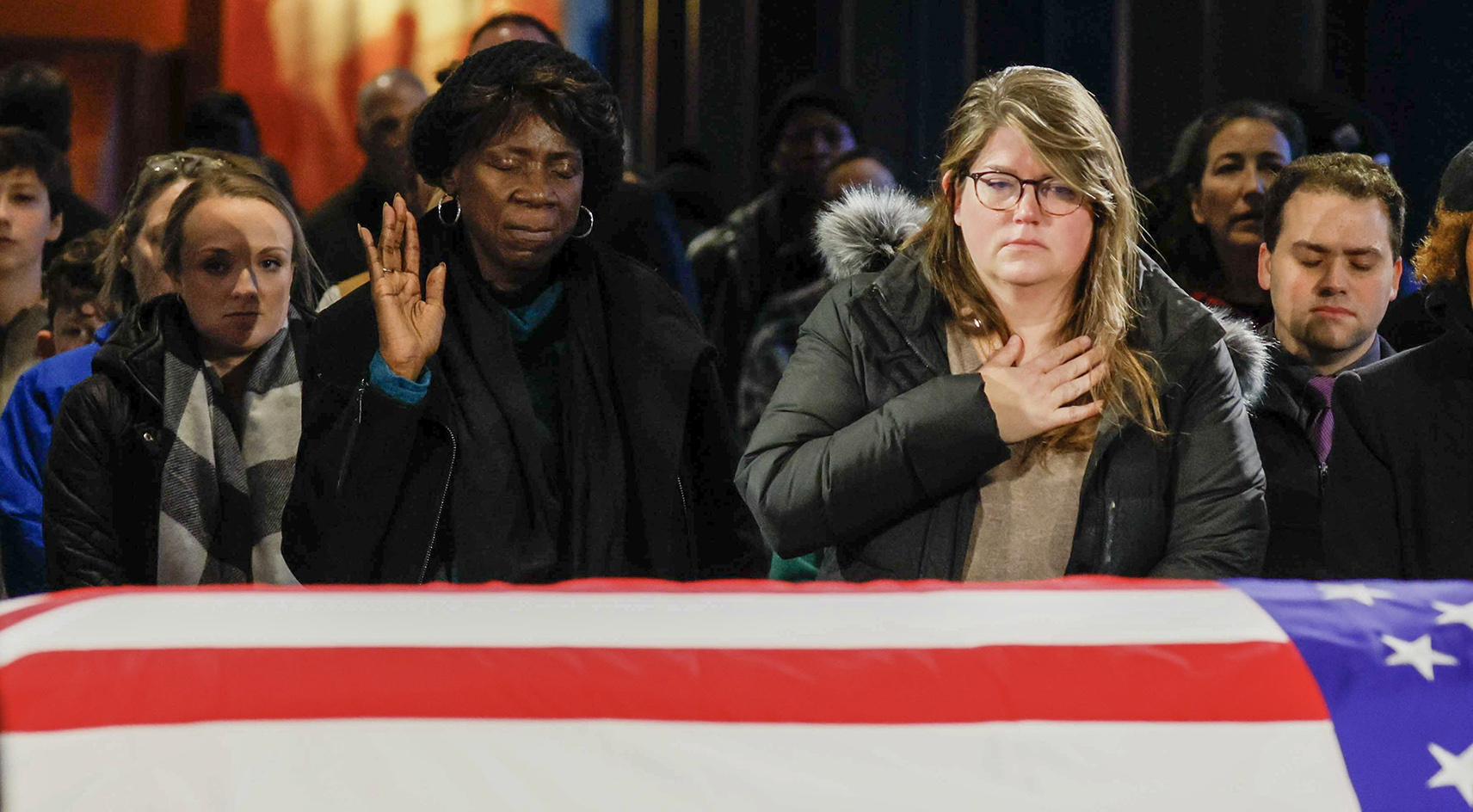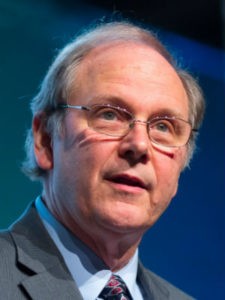On Saturday, Jan. 4, former President Jimmy Carter’s body made the final journey from his home in Plains, Ga., to the Carter Center in Atlanta, where he had been so many times since its establishment 42 years ago. The remains of the former president and former governor of Georgia, global humanitarian, author of 32 books, Nobel Peace Prize recipient, Sunday school teacher and peanut farmer rode in a flag-draped coffin in a shiny black hearse.
Secret service agents and law-enforcement officers accompanied the procession in a display of national appreciation and personal respect. Admirers, regardless of political affiliation — grateful people of many races and ethnicities, backgrounds, ages, professions and life circumstances — lined the roads and crowded the overpasses to pay their respects silently and to honor this beloved man for his life of service.
Along the way, the television camera focused on a man holding a homemade sign that said, simply, “He was one of us.”
When the hearse came to rest in the circular drive at the Carter Center and the flag-draped casket was removed, “Hail to the Chief” resounded. News journalists remarked that Carter never had liked the pomp surrounding that musical tribute to himself or his position and that during his presidency, he had ordered that it not be played. An honor guard of pallbearers representing all six branches of the military slowly escorted the casket into the small auditorium, while the 282nd Army Band from Fort Jackson, S.C., played “America the Beautiful” and a hymn Carter, the man of faith, loved and tried to personify — “Be Thou My Vision.”
Carter’s discomfort at the playing of “Hail to the Chief” was reflective of the person CBS News called “a man of vision, faith and humility.” So was the tenor and content of the service he had planned for the ordinary space at the center.
Lindsay Chervinsky, George Washington Presidential Library historian, also described Carter as “a very humble man,” one who was “very uninterested in the trappings of Washington, D.C.” It was likely Carter’s humility, as well as his desire to be close to the people, which caused Jimmy, Rosalynn and Amy to exit the limousine during his Inaugural Day parade and walk to the White House, greeting cheering onlookers along Pennsylvania Avenue.

Visitors gather to honor Jimmy Carter as he lies in repose at the Jimmy Carter Presidential Library and Museum on January 6 in Atlanta. (Photo by Miguel Martinez – Pool/Getty Images)
As the funeral procession entered the Carter Center amid the standing mourners who had come to pay tribute to a life remarkably well-lived, the Morehouse College Glee Club sang “Eternal Father, Strong to Save,” also known as the “Naval Hymn.” Written by William Whiting in 1860, the hymn has been used as “a prayer for divine protection and guidance, particularly for those at sea, reflecting Whiting’s concern for mariners and their families. The anthem was a fitting funeral song for President Carter, who graduated from the Naval Academy with distinction in 1946, served two years as an ensign on the USS Wyoming, was executive officer, engineering officer and electronics repair officer on the submarine SSKI-1, and then was selected by Admiral Hyman G. Rickover to help create nuclear-powered submarines.
When his father died in July 1953, however, Carter declared his responsibilities to his family, thus he was honorably discharged from the Navy with the rank of lieutenant and returned to his Georgia home to manage the peanut business. Years later, the Seawolf-class nuclear powered submarine “Jimmy Carter” was christened in honor of the 39th president.
The former president, who had grown up in a Plains farmhouse without electricity or running water, learned from his father the importance of carefully watching his money. Thriftiness and self-denial were important traits to rural people like the Carters who lived with the constant threat of a bad crop year. Young Jimmy took these attributes into the Navy, and later into his governorship and presidency. The simplicity of his lifestyle also was apparent in the funeral that honored the man and his personality.
“The former president, who had grown up in a Plains farmhouse without electricity or running water, learned from his father the importance of carefully watching his money.”
In addition to the Naval Hymn, the Glee Club sang stirring renditions of “The Lord’s Prayer” and “The Battle Hymn of the Republic.” Carter’s son Chip and grandson Jason gave emotional speeches representing the family, who were seated in folding chairs in front of the casket. In addition to the accolades they gave their beloved dad and grandad, they also repeatedly expressed gratitude to those gathered for the funeral. These were employees of all ranks from the Carter Center — visionaries like Carter and stewards of the more than four decades of life-changing work. As Jason said, “The people in this room … are the real keepers of my grandparents’ legacy.”
He added: “We will spend this week celebrating his incredible life, and a life I think we can all agree is as full and as powerful as any life can be. As someone said, ‘It’s amazing what you can cram into 100 years!’”
Then Jason began to talk directly to the audience: “But as we celebrate that legacy, I want you to know that in many ways we’re talking about the work that you do every day” This repeated recognition of the loyal co-laborers with Jimmy and Rosalynn Carter — a reiteration of the dedication and sacrifice of ordinary Americans rather than a litany of achievements and awards of the deceased himself — manifested the spirit of the humble man who was Jimmy Carter.
Tony Lowden, Carter’s pastor and friend, told how he had regularly visited the president during the final months of his life. He described how he would encounter Carter, sitting wrapped in a blanket inscribed with the biblical citation from “Psalm 23,” one of Carter’s favorite psalms: “The Lord is my shepherd, there is nothing I lack.”
“The Lord is my shepherd, there is nothing I lack.”
For this man whose life was spent among his rural neighbors and the poor and needy in Africa, South America and around the world, who lived in the very same one-story, ranch-style home for more than six decades, “there is nothing I lack” was not just a Bible verse but a life motto. Indeed, while some presidents have imposing homes — like Thomas Jefferson’s neoclassical mansion of Monticello, or Franklin D. Roosevelt’s restored 19th century Italian villa in Hyde Park, or John F. Kennedy’s Cape Cod seaside family compound, it was not so for Jimmy and Rosalynn Carter.
Son Chip shared personal reflections, saying, “I want to tell you a little bit about him as a human being.”
He related three stories about his childhood and youth. In one anecdote, he admitted that in high school he had received a failing grade at the end of his first semester of Latin. His dad was not pleased and asked to borrow Chip’s Latin textbook. Each day during that Christmas vacation, Chip said, his dad found time at work to study a portion of the book, then taught the material to his son that evening. When the spring semester began, Chip asked for and was given the chance to retake a midterm Latin exam and he made a 100. Passing Latin and learning the benefit of hard work, Chip admitted, were Christmas gifts he received from his father, “who spent that kind of time with me.”
Bernstine Hollis, an African American coworker of Jimmy Carter for many years, offered a prayer of gratitude for the humanitarian life of her friend and mentor. The love and respect she had for the president were evident not only in her words but her facial expression and voice as well.
As the service was concluding, Steve Osunsame, senior national correspondent for ABC News, recounted his own personal experience with the former president. He recalled an interview with Carter in the summer of 2014. The two of them were seated in the basement of the Carter Center, and it was very warm. Osunsame said he really wanted the air conditioning to be turned on, but was told by an employee of the Center, “Oh no, we cannot do that. President Carter will not let anyone, including you, step on his electric bill.” Then the newscaster observed, Carter had a “stubborn frugality.”
It was that stubborn frugality that made Carter unwilling to upgrade the kitchen appliances for Rosalynn, as long as the old ones still worked, despite the encouragement of his children and friends. It was that stubborn frugality that kept them on the farm, in their simple house, from which they walked to church, shopped in the locally owned stores, dressed simply and guarded against any waste or indulgence.
Carter’s stubborn frugality was a part of his presidency also. He was “famous for wearing sweaters to dramatize how he’d turned down the White House thermostats,” and “pushed through comprehensive energy legislation.” He had 32 solar panels installed on the White House roof in 1979, becoming the first president to recognize the importance of protecting the environment. Sadly, seven years later President Ronald Reagan ordered the panels removed.
President Carter’s frugality provides a very sharp contrast to the willful extravagance of the president-elect, whose New York City penthouse residence from 1983 to 2019 was famous for its excess. Located on floors 57, 58 and 59 of Trump Tower, it was famous for its gold fixtures and many other excesses. Trump described it as the “best apartment ever built” and the “finest (apartment) in the top building in the best location in the hottest city in the world.”
Trump currently lives in Florida at Mar-a-Lago, called the “crown jewel of Palm Beach.”
Stubborn frugality versus willful extravagance is not the only contrast that can be drawn between Jimmy Carter and Donald Trump. One might suggest a distinction between Carter’s pledge never to tell a lie to the American people and Trump’s thousands of documented untruths. Or perhaps it is fair to compare the self-effacement of Carter with the narcissism of Trump. Alternately, the modesty of the Plains farmer/nuclear engineer might be placed alongside the self-promotion of the New York businessman/television personality.
Numerous contrasts between No. 39 and No. 45 and 47 might be found, but the values of stubborn frugality and willful extravagance provide a remarkable way of portraying two ways of living and serving our country.
I know which way I respect more.
Rob Sellers is professor of theology and missions emeritus at Hardin-Simmons University’s Logsdon Seminary in Abilene, Texas. He is a past chair of the board of the Parliament of the World’s Religions in Chicago. He and his wife, Janie, served a quarter century as missionary teachers in Indonesia. They have two children and five grandchildren.
Related articles:
The art of patriotic dealmaking | Opinion by Robert Sellers
‘He taught the Bible every Sunday from World War II to COVID’
The fear driving Trump’s grift | Opinion by Alan Bean



